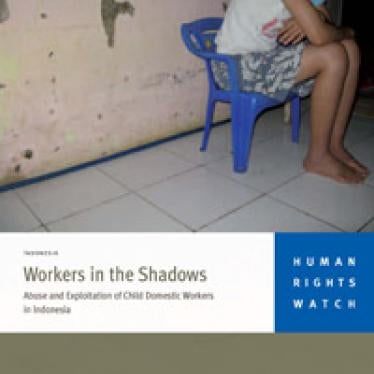Siti was 16, but seemed older. I met her the year after I graduated from high school in her hometown, Bogor. Siti was just back from Jakarta to care for her ailing mother, the caretaker of the home where my mother and I were vacationing in the middle of the tea fields. We got to know each other at the kitchen table. While cutting small purple onions, she told me she had been a domestic worker in Jakarta since she was 11 and that she hadn't been to school since. I didn't think too much of her disclosure; I had seen many young women working in other people's homes. That was the way of things, I thought then.
Siti's curly hair was a gift from her Ambonese mother, and in her build and features Siti seemed like my alter ego, so I became curious about her life. In Jakarta, she had to take care of three young children and do many chores. She said she was happy to be home. As hard as she was working taking care of her mother and the house, it wasn't nearly as hard as her work in Jakarta, from 4 a.m. until 9:30 p.m. Now I find myself wondering what Siti would be like as a 40-year-old woman, and what kind of future her own children face.
After becoming a mother, I learned that the lives of children are not everywhere the same. Not all children have the same hopes, nor are the same expectations placed upon them.. Still, some things are universal. One is that children have the capacity for imagination. Without imagination they cannot build healthy communities and families. Without imagination, they cannot learn to avoid abuse or violence. Without imagination, they cannot learn to remedy injustice, combat discrimination, or correct the unsustainable and inequitable use of environmental resources. To cultivate that imagination they require choice, safety, and education. Child labor threatens all three.
I spent much of my childhood in Indonesia accompanying my mother as she worked with women engaged in micro-enterprises, making kapok pillows, tiles, or pottery. Mom worked with them in developing their business skills and managing rural credit programs. Several years before meeting Siti, I remember following Mom to a village with a kretek cigarette factory. To remind me of my own good fortune, Mom had me spend a few hours rolling cigarettes in the factory, where young children (some not even in their teens) were working. At first it was fun. But by the third hour I felt heavy with the injustice of it; I was bored, exhausted, and frustrated, and imagined a lifetime of those feelings.
As both a mother and a teacher of girls, I am particularly concerned about the safety of child domestic workers, the work for which girls are most likely to be hired. I remember when I was young, my mother was thanked so profusely for basic kindnesses like a decent wage and bonuses that I could only assume that these modest payments were not universal. I saw the informal arrangements in friends' homes: certainly no minimum wage or overtime pay. Some girls had not seen their families in years. People thought there was nothing wrong with children doing chores and babysitting all day and into the evening; it was considered a natural little sister's work. They assumed that poor children had to work and wouldn't use an education anyway. A recent report by Human Rights Watch, Workers in the Shadows, documents that such exploitation and abuse continue to be widespread, along with such limiting and discriminatory presumptions about these girls.
Indonesia has made much progress with civil rights. Yet social justice demands that we continue to challenge norms, and think about the ways we have relaxed standards for other people's children. I imagine with terror the idea of my daughter working with no protections against physical or sexual abuse, no health care, living in spare conditions in someone else's lavish home, trapped in a life with little merriment.
Indonesia has so much to teach the world in terms of its artistry, culture, and kinship. As a child of Indonesia myself, I implore everyone to come together to recognize our vast resources and our immense responsibility. We can seriously regulate such labor and guarantee that the kids go to school as well. We can create a model written agreement for employment and enforce minimum conditions of housing, food, freedom of movement, and communication with family. We can insist that employers register the names and age of domestic workers with local labor agencies. We can find ways to help the poor pay school costs so that children can stay in school and are not pushed into the workforce. We can increase awareness of laws and engage the public. We can compel law enforcement to pay attention to girls' complaints. We can press our leaders to address child labor as a priority.
Collectively, we must show sensitivity and courage. We must not tolerate inappropriate child labor and cannot abdicate responsibility. If Indonesia is to move forward and become the greatest version of itself, then the nation must be vigilant about protecting its young. I hope Siti's granddaughters have choices well beyond Siti's own, and that we all lean on the edges of the known to move into the realm of the possible for our children.
Dr. Soetoro-Ng is a teacher at a high school for girls in Hawaii, and the founder of an educational non-profit. She was born in Indonesia.







